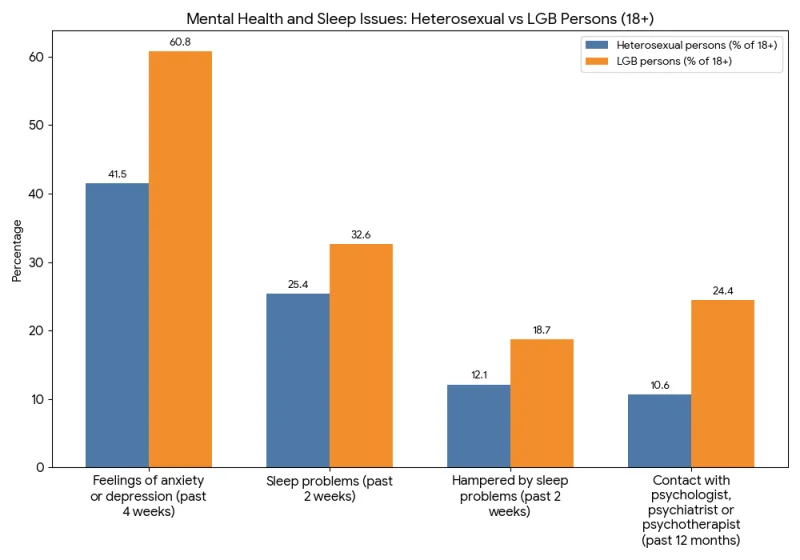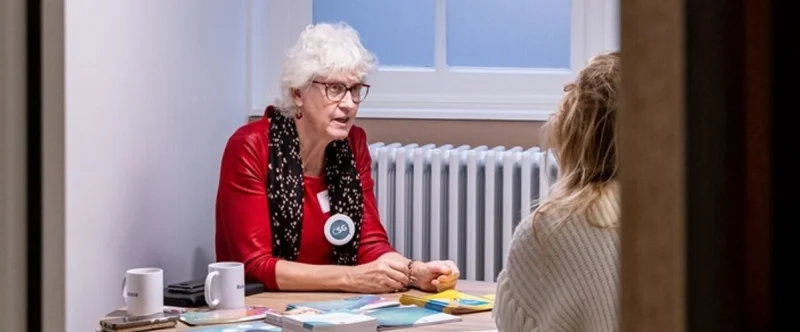A Sobering Reality Check for Our Community
New figures released by the Dutch Central Bureau for Statistics (CBS) have painted a stark and concerning picture of mental health within the LGBTQ+ community in the Netherlands. The data, collected in 2023 and 2024, confirms what many of us have long felt and experienced: lesbian, gay, and bi+ (LHB+) people face significantly greater mental health challenges than their heterosexual peers. While these numbers are troubling, they provide crucial evidence to advocate for better support and understanding.
The Numbers Don't Lie: A Widening Gap
The CBS Health Survey reveals a consistent pattern of disparity across several key indicators of mental wellbeing. The differences are not minor; they represent a significant public health issue for our community.
- Anxiety & Depression: A staggering 61% of LHB+ adults reported feelings of anxiety or depression, compared to 42% of heterosexual adults.
- Seeking Help: LHB+ individuals are more than twice as likely to seek professional help. 24% had contact with a psychologist, psychiatrist, or psychotherapist in the past year, versus just 11% of heterosexuals.
- Sleep Issues: About one-third (33%) of the LHB+ community struggles with sleep problems, compared to 25% of the heterosexual population.
Bi+ Individuals Are a Particularly Vulnerable Group
While the overall numbers for the LHB+ community are concerning, the report highlights an even more urgent situation for bi+ individuals. This group, which includes anyone attracted to more than one gender, consistently reported the poorest mental health outcomes.
The data shows:
- Two-thirds (67%) of bi+ people experience feelings of anxiety or depression.
- One in three (33%) bi+ individuals have sought professional mental health care in the last year—three times the rate of heterosexuals.
- Over a third (36%) of bi+ people report sleep problems, with 22% saying it hinders their daily life.
These statistics underscore the unique pressures faced by the bi+ community, which can include biphobia and erasure from both heterosexual and parts of the LGBTQ+ community, leading to heightened feelings of isolation. This phenomenon, often called 'double discrimination', is a significant factor in minority stress.
How Do Gay and Lesbian People Fare?
The mental health of gay and lesbian individuals also diverges significantly from heterosexual norms, though their experiences differ slightly from the bi+ community. While they report similar rates of sleep problems as heterosexuals, they are more likely to struggle with their mental wellbeing.
- 55% of gay and lesbian people reported anxiety or depression symptoms.
- 20% had contact with a mental health professional, nearly double the rate of heterosexuals.
Why Is This Happening? Beyond the Numbers
The CBS report notes that factors like age and gender don't fully explain these disparities. The root causes are likely tied to the concept of minority stress—the chronic stress faced by members of stigmatized minority groups. This can stem from various sources:
- Discrimination and Prejudice: Experiencing overt or subtle homophobia and biphobia in daily life.
- Internalized Stigma: Absorbing negative societal messages about one's own identity.
- Expectation of Rejection: Constantly being on guard for negative reactions from others.
- Concealment: The stress of hiding one's identity in certain environments (work, family, etc.).
Looking Ahead: The Need for Targeted Support
These findings are a clear call to action. It's not enough to know these numbers; we must use them to demand better, more accessible, and culturally competent mental healthcare for the entire LGBTQIA+ community. It's also a reminder to check in on each other, to foster safe spaces, and to fight against the stigma that contributes to these statistics.
It's important to note the limitations of this study. The CBS data is based on sexual attraction and does not include specific figures for transgender, intersex, asexual, or other queer identities, whose mental health experiences are also critically important and often show even greater disparities.
Where to Find Support in the Netherlands
If you are struggling, please know you are not alone and help is available. Here are a few resources:
- De Luisterlijn: For anonymous, confidential support by phone or chat, available 24/7. Call 088 0767 000.
- Switchboard: An information and support service for the LGBTQIA+ community. Visit switchboard.nl.
- Roze in Blauw: The national network of the Dutch police for the LGBTQIA+ community. Report discrimination or hate crimes.
- 113 Suicide Prevention: If you are having suicidal thoughts, call 113 or 0800-0113, or chat via 113.nl.





